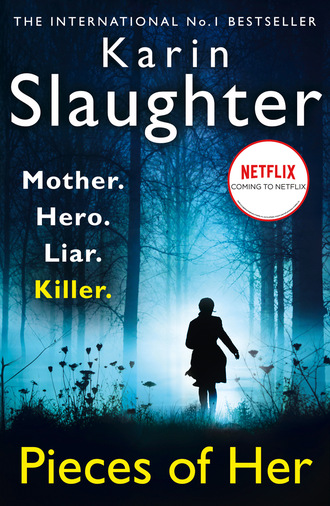There was a crowd in front of the elevator. Again, no Detective Palazzolo, but Andy used the stairs anyway. She walked carefully this time. Her knuckle had stopped bleeding. She threw the napkin into a trash can outside the stairwell. The air in the hospital’s main waiting room was tinged with chemicals and vomit. Andy hoped that the vomit smell wasn’t coming from her. She looked down at her shirt to check.
“My Lord,” someone muttered. “My good Lord.”
The TV.
A sudden understanding hit Andy like a punch to the face.
Every single person in the waiting room, at least twenty people, was watching the diner video play on CNN.
“Holy crap,” someone else said.
On the television, Laura’s hands were showing five fingers and a thumb for six bullets.
Helsinger was standing in front of her. Cowboy hat. Leather vest. Gun still out.
A banner rolled across the bottom of the TV warning people that they were about to see graphic content.
A woman asked, “What’s he doing?”
Helsinger was drawing his knife from the sheath on his hip.
“What the—”
“Oh, shit!”
The crowd went silent as they watched what came next.
There were gasps, a shocked scream, like they were inside a movie theater instead of a hospital waiting room.
Andy was as transfixed as everyone else. The more she watched it, the more she was able to see it happening outside of herself. Who was that woman on the television? What had Laura become while Andy was cowering against the broken window pane?
Someone joked, “Like some kinda ninja granny.”
“Grambo.”
There was uncomfortable laughter.
Andy couldn’t listen to it. She couldn’t be in this room, in this hospital, in this emotional turmoil where the tether that had always linked her back to her mother had been broken.
She turned around and slammed right into a man who was standing too close behind her.
“Sorry.” He tipped his Alabama baseball cap at her.
Andy wasn’t in the mood for chivalry. She stepped to the left as he stepped to the right. The opposite happened when she stepped to the right.
He laughed.
She glared at him.
“My apologies.” Alabama took off his hat and made a sweeping gesture, indicating that she could pass.
Andy walked so quickly that the sliding doors didn’t have time to fully open. She slapped her hand against the frame.
“Bad day?” Alabama had followed her outside. He stood at a respectful distance, but even that felt too close. “You all right?”
Andy glared at him again. Had he not just seen what was on television? Did he not understand that Andy was the useless girl whose mother had faced down a cold-blooded murderer?
And then turned into a murderer herself?
“Is something wrong, Officer?” Alabama kept smiling at Andy.
She looked down at her police-like uniform. The stupid silver badge that was stitched on like a Girl Scout patch—but with far less meaning, because Girl Scouts had to at least do something for those patches. All Andy did was answer phones and walk terrified people through performing CPR or turning off their car engines after a crash.
Jonah Lee Helsinger had thought that she was a cop.
He had thought that she would kill him. Murder him. In cold blood.
Andy looked down at her own hands. They would not stop shaking. She was going to start crying again. Why did she keep crying?
“Here.” Alabama offered her a handkerchief.
Andy stared at the folded white cloth. She thought Gordon was the only man who still carried a handkerchief.
“Just trying to help a lady in need,” he grinned, still holding out the cloth.
Andy did not take it. For the first time, she really looked at the man. He was tall and fit, probably close to forty. Jeans and sneakers. His white button-down shirt was open at the collar, long sleeves neatly rolled up. He looked like he had forgotten to shave this morning, or maybe that was part of his look.
A thought occurred to her that was so startling she blurted it out. “Are you a reporter?”
He laughed and shook his head. “I make my living the honest way.”
“You’re a cop?” she tried. “Detective?” When he did not immediately answer, she told him, “Please leave me alone.”
“Whoa, porcupine.” He held up both his hands in surrender. “I was just making small talk.”
Andy did not want to talk. She scanned the drive for Gordon’s white BMW.
Where was her father?
Andy took out her cell phone. The home screen was filled with text alerts and missed calls. Mindy Logan. Sarah Ives. Alice Blaedel. Danny Kwon. In the last few hours, the smattering of band, chorus and drama geeks Andy had been friends with in high school had all suddenly remembered her phone number.
She dismissed the notices, then pulled up DAD and texted: hurry.
Alabama finally seemed to realize that she wasn’t open to small talk. He tucked his handkerchief back into his jeans pocket. He walked over to one of the benches and sat down. He pulled out his phone. His thumbs worked across the screen.
Andy glanced behind her, wondering what was taking Laura so long. Then she scanned the front parking area for Gordon. Her father was probably in the parking deck, which meant he would be at least twenty minutes because the woman working the booth had to talk to every single person who handed her a ticket to get out.
All she could do was sit down on a bench three down from Alabama. Every muscle in Andy’s body felt like an overstretched rubber band. Her head throbbed. Her stomach was sour. She checked her phone to see if Gordon had texted back, but he would never look at his phone while he was driving because it was dangerous.
The sliding doors opened. Andy felt relief, then trepidation, upon seeing her mother. The orderly pushed the wheelchair to a stop beside the curb. Laura was wearing a cotton candy pink Belle Isle Medical Center T-shirt that was too big for her slender frame. She was clearly in pain. Her face was the color of notebook paper. Her good hand was wrapped around the arm of the chair in a death grip.
Andy asked, “Didn’t they give you anything?”
Laura said nothing, so the orderly volunteered, “The surgery meds are wearing off. The doc offered her a script but she wouldn’t take it.”
“Mom—” Andy didn’t know what to say. Laura wouldn’t even look at her. “Mother.”
“I’m fine,” Laura insisted, though her teeth were gritted. She asked the orderly, “Do you have a cigarette?”
“You don’t smoke,” Andy said, just as her mother reached for a Marlboro from the pack that the orderly pulled from his shirt pocket.
The man cupped his hand as he flicked the lighter.
Andy stepped away from the smell.
Laura didn’t seem to notice. She took a deep drag, then coughed out white puffs of smoke. She held the cigarette awkwardly, pinched between her thumb and forefinger the way a junkie would.
“I’m all right,” Laura said, her voice a raspy whisper. “I just need some space.”
Andy took her at her word. She stepped farther away, putting distance between herself and her mother. She looked at the parking deck, willing Gordon to hurry. She started to cry again, but quietly. She didn’t know what to do. None of this made any sense.
Laura said, “There are some boxes at your father’s house.”
Andy’s lips trembled. Silence eluded her. She had to have answers. “What did I do wrong?”
“You didn’t do anything wrong.” Laura smoked the cigarette. “I just need to stop coddling you. You need to learn to stand on your own two feet.”
“By moving in with Dad?” She needed this to make sense. Laura always made sense. “Mom, please—”
Laura took a last hit from the cigarette, then handed it to the orderly to finish. She told Andy, “Pack what you need for the night. Your dad won’t let you stay with him forever. You’ll work out a budget. You’ll see what you can afford. You could move to Atlanta, or even back to New York.” She looked up at Andy from her chair. “You have to go, Andrea. I want to be alone now. I’ve earned the right to be alone.”
“I didn’t …” the words got tangled in Andy’s mouth. “I never—”
“Stop,” Laura said. She had never talked to Andy this way. It was as if she hated her. “Just stop.”
Why?
“Thank God,” Laura muttered as Gordon’s BMW glided to a stop in front of the wheelchair ramp.
“Help me up.” Laura held out her hand for the orderly, but the guy in the Alabama hat was suddenly at her side.
He said, “Happy to be of service, ma’am.”
If Andy hadn’t been watching closely, she would’ve missed the look that flashed across her mother’s face. Panic? Fear? Disgust?
He said, “Up you go.”
“Thank you.” Laura let him lift her to standing.
Gordon came around the car and opened the door. He told Alabama, “I’ve got it from here.”
“No problem, big guy.” Alabama didn’t relinquish his hold. He guided Laura down to the front seat, then gently lifted her legs as she turned to face the front. “Take care, now.”
Gordon said, “Thank you.”
“My pleasure.” Alabama offered Gordon his hand. “I’m sorry for the situation your wife and daughter are in.”
“Uh—yes.” Gordon was too polite to correct him about his marital status, let alone refuse to shake his hand. “Thank you.”
Alabama tipped his hat at Andy as she got into the back of the car. He shut the door before she could slam it in his face.
Gordon got behind the wheel. He sniffed the air with visible distaste. “Have you been smoking?”
“Gordon, just drive.”
He waited for her to look at him. She did not. He put the car in gear. He drove away from the portico, past the entrance to the parking garage, then pulled over and parked the car. He turned to Laura. His mouth opened. Nothing came out.
“No,” she said. “Not here. Not now.”
He shook his head slowly back and forth.
“Andy doesn’t need to hear this.”
Gordon didn’t seem to care. “The kid’s father was Bobby Helsinger. Did you know that?”
Laura’s lips pursed. Andy could tell she knew.
Gordon said, “He was the sheriff of Bibb County before a bank robber blew off his head with a shotgun. This was six months ago, around the same time the detective says Jonah Helsinger started weaponizing.”
The vest and gunbelt.
Palazzolo had told them that Jonah bought it off Amazon six months ago.
Gordon said, “I looked up the obituary on my phone. Jonah’s got three uncles who are cops, two cousins who are in the military. His mother used to work at the district attorney’s office in Beaufort before she went private. The family’s practically law enforcement royalty.” He waited for Laura to say something. “Did you hear me? Do you understand what I’m saying to you?”
Laura took a sharp breath before speaking. “His family royalty does not negate the fact that he murdered two people.”
“He didn’t just murder them. He planned it. He knew exactly what he was doing. He had maps and—” Gordon shook his head, like he could not believe how stupid she was. “Do you think the family’s going to believe their little boy is a sadistic murderer, or do you think they’re going to say he had some kind of mental problem because his hero daddy was murdered by a bank robber and all of this was a cry for help?”
“They can say what they want.”
“That’s the first thing you’ve said that makes any fucking sense,” Gordon snapped. “The Helsingers are going to say exactly what they want—that yeah, this poor, heart-broken, dead cop’s son deserved to go to prison for what he did, but he didn’t deserve to be viciously murdered.”
“That’s not—”
“They’re going to take you down harder than him, Laura. You did that kid a favor. This is all going to be about what you did, not what he did.”
Laura kept silent.
Andy stopped breathing.
Gordon asked, “Do you know there’s a video?”
Laura did not answer, though she must have seen the TV when the orderly wheeled her through the waiting room.
“That detective showed—” Gordon had to stop to swallow. “The look on your face when you killed him, Laura. The serenity. The everyday-ness. How do you think that’s going to stack up against a mentally troubled, fatherless teenage boy?”
Laura turned her head and looked out the window.
“Do you know what that detective kept asking? Over and over again?”
“The pigs always ask a lot of questions.”
“Stop fucking around, Laura. What did you say before you killed him?” Gordon waited, but she did not respond. “What did you say to Helsinger?”
Laura continued to stare out the window.
“Whatever you said—that’s motivation. That’s the difference between maybe—just maybe—being able to argue justifiable homicide and the death penalty.”
Andy felt her heart stop.
“Laura?” He banged his hand on the steering wheel. “God dammit! Answer me. Answer me or—”
“I am not a fool, Gordon.” Laura’s tone was cold enough to burn. “Why do you think I refused to be interviewed? Why do you think I told Andrea to keep her mouth shut?”
“You want our daughter to lie to a police detective? To perjure herself in court?”
“I want her to do what she always does and keep her mouth shut.” Her tone was quiet but her anger was so palpable that Andy felt like the air was vibrating with rage.
Why wasn’t her mother arguing that Gordon was wrong? Why wasn’t she saying that she didn’t have a choice? That she was saving Andy? That it was self-defense? That she was horrified by what she had done? That she had panicked or just reacted or was terrified and she was sorry—so sorry—that she had killed that troubled kid?
Andy slid her hand into her pocket. The detective’s card was still wet from the bathroom counter.
Palazzolo tried to talk to me again. She wanted me to turn on you. She gave me her card.
Gordon said, “Laura, this is deadly serious.”
She fake-laughed. “That’s an interesting choice of words.”
“Cops protect their own. Don’t you know that? They stick together no matter what. That brotherhood bullshit is not just some urban legend you hear on TV.” Gordon was so angry that his voice broke. “This whole thing will turn into a crusade just by virtue of the kid’s last name.”
Laura inhaled, then slowly shushed it out. “I just—I need a moment, Gordon. All right? I need time alone to think this through.”
“You need a criminal litigator to do the thinking for you.”
“And you need to stop telling me what to do!” She was so furious that she screeched out the words. Laura covered her eyes with her hand. “Has hectoring me ever worked? Has it?” She wasn’t looking for an answer. She turned to Gordon, roaring at him, “This is why I left you! I had to get away from you, to get you out of my life, because you have no idea who I am. You never have and you never will.”
Each word was like a slap across her father’s face.
“Jesus.” Laura grabbed the handle above the door, tried to shift her weight off her injured leg. “Will you drive the fucking car?”
Andy waited for her father to say Laura was welcome to walk home, but he didn’t. He faced forward. He pushed the gear into drive. He glanced over his shoulder before hitting the gas.
The car lurched toward the main road.
Andy didn’t know why, but she found herself turning to look out the back window.
Alabama was still standing under the portico. He tipped his hat one last time.
The look on her mother’s face—panic? Fear? Disgust?
Is something wrong, Officer?
Alabama stood rooted in place as Gordon took a left out of the hospital drive. He was still standing there, head turning to follow their progress, when they drove down the street.
Andy watched him watching the car until he was just a speck in the distance.
I’m sorry for the situation your wife and daughter are in.
How had he known that Gordon was her father?
Andy stood under the shower until the hot water ran out. Manic thoughts kept flitting around inside of her head like a swarm of mosquitos. She could not blink without remembering a stray detail from the diner, from the video, from the police interview, the car.
None of it made sense. Her mother was a fifty-five-year-old speech therapist. She played bridge, for chrissakes. She didn’t kill people and smoke cigarettes and rail against the pigs.
Andy avoided her reflection in the bathroom mirror as she dried her hair. Her skin felt like sandpaper. There were tiny shards of glass embedded in her scalp. Her chapped lips had started bleeding at the corner. Her nerves were still shaky. At least she thought it was her nerves. Maybe it was lack of sleep that was making her feel so jumpy, or the absence of adrenaline, or the desperation she felt every time she replayed the last thing that Laura had said to Andy before she went into the house—
I’m not going to change my mind. You need to leave tonight.
Andy’s heart felt so raw that a feather could’ve splayed it open.
She rummaged through the clean clothes pile and found a pair of lined running shorts and a navy-blue work shirt. She dressed quickly, walking to the window as she did up the buttons. The garage was detached from the house. The apartment was her cave. Gray walls. Gray carpet. Light-blocking shades. The ceiling sloped with the roofline, only made livable by two tiny dormers.
Andy stood at the narrow window and looked down at her mother’s house. She could not hear her parents arguing, but she knew what was happening the same way that you knew you had managed to give yourself food poisoning. She was seized by that awful, clammy feeling that something just wasn’t right.
The death penalty.
Where had her mother even learned to catch a knife like that? Laura had never been in the military. As far as Andy knew, she hadn’t taken any self-defense classes.
Almost every day of her mother’s life for the last three years had been spent either trying not to die from cancer or enduring all the horrible indignities that cancer treatment brought with it. There had not been a hell of a lot of free time to train for hand-to-hand combat. Andy was surprised her mother had been able to raise her arm so quickly. Laura struggled to lift a grocery bag, even with her good hand. The breast cancer had invaded her chest wall. The surgeon had removed part of her pectoral muscle.
Adrenaline.
Maybe that was the answer. There were all kinds of stories about mothers lifting cars off their trapped babies or performing other tremendous physical feats in order to protect their children. Sure, it wasn’t common, but it happened.
But that still didn’t explain the look on Laura’s face when she pulled the knife through. Blank. Almost workman-like. Not panicked. Not afraid. She could’ve just as easily been sitting at her desk reviewing a patient’s chart.
Andy shivered.
Thunder rumbled in the distance. The sun would not go down for another hour, but the clouds were dark and heavy with the promise of rain. Andy could hear waves throwing themselves onto the beach. Seagulls hashing out dinner plans. She looked down at her mother’s tidy bungalow. Most of the lights were on. Gordon was pacing back and forth in front of the kitchen window. Her mother was seated at the table, but all that Andy could make out was her hand, the one that wasn’t strapped to her waist, resting on a placemat. Laura’s fingers occasionally tapped, but otherwise she was still.
Andy saw Gordon throw his hands into the air. He walked toward the kitchen door.
Andy stepped back into the shadows. She heard the door slam closed. She chanced another look outside the window.
Gordon walked down the porch stairs. The motion detector flipped on the floodlights. He looked up at them, shielding his eyes with his hand. Instead of heading toward her apartment, he stopped on the bottom riser and sat down. He rested his forehead on the heels of his hands.
Her first thought was that he was crying, but then she realized that he was probably trying to regain his composure so that Andy wouldn’t be even more worried when she saw him.
She had seen Gordon cry once, and only once, before. It was at the beginning of her parents’ divorce. He hadn’t let go and sobbed or anything. What he had done was so much worse. Tears had rolled down his cheeks, one long drip after another, like condensation on the side of a glass. He’d kept sniffing, wiping his eyes with the back of his hand. He had left for work one morning assuming his fourteen-year marriage was solid, then before lunchtime had been served with divorce papers.
“I don’t understand,” he had told Andy between sniffles. “I just don’t understand.”
Andy couldn’t remember the man who was her real father, and even thinking the words real father felt like a betrayal to Gordon. Sperm donor felt too overtly feminist. Not that Andy wasn’t a feminist, but she didn’t want to be the kind of feminist that men hated.
Her birth father—which sounded strange but kind of made sense because adopted kids said birth mother—was an optometrist whom Laura had met at a Sandals resort. Which was weird, because her mother hated to travel anywhere. Andy thought they’d met in the Bahamas, but she was told the story so long ago that a lot of details were lost.
These were the things she knew: That her birth parents had never married. That Andy was born the first year they were together. That her birth father, Jerry Randall, had died in a car accident while on a trip home to Chicago when Andy was eighteen months old.
Unlike Laura’s parents, who had both died before Andy was born, Andy still had grandparents on her birth father’s side—Laverne and Phil Randall. She had an old photo somewhere of herself, no more than two, sitting in their laps, balanced between each of their knees. There was a painting of the beach on the wood-paneled wall behind them. The couch looked scruffy. They seemed like kind people, and maybe they were in some ways, but they had completely cut off both Laura and Andy when Gordon had entered their lives.
Gordon—of all people. A Phi Beta Sigma who had graduated Georgetown Law while working as a volunteer coordinator at Habitat for Humanity. A man who played golf, loved classical music, was the president of his local wine-tasting society and had chosen for his vocation one of the most boring areas of the law, helping wealthy people figure out how their money would be spent after they died.
That Andy’s birth grandparents had balked at the dorkiest, most uptight black man walking the planet simply because of the color of his skin was enough to make Andy glad she didn’t have any contact with them.
The kitchen door opened. Andy watched Gordon stand up. He tripped the floodlights again. Laura handed him a plate of food. Gordon said something Andy could not hear. Laura slammed the door in lieu of response.
Through the kitchen window, she saw her mother making her way back to the table, gripping the counter, the doorjamb, the back of a chair—anything she could find to take the pressure off of her leg.
Andy could’ve helped her. She could’ve been down there making her mother tea or helping her wash off the hospital smell the way she’d done so many times before.
I’ve earned the right to be alone.
The TV by Andy’s bed caught her attention. The set was small, formerly taking up space on her mother’s kitchen counter. By habit, Andy had turned it on when she walked through the door. The sound was muted. CNN was showing the diner video again.
Andy closed her eyes, because she knew what the video showed.
She breathed in.
Out.
The air-conditioner hummed in her ears. The ceiling fan wah-wahed overhead. She felt cold air curl around her neck and face. She was so tired. Her brain was filled with slow-rolling marbles. She wanted to sleep, but she knew she could not sleep here. She would have to stay at Gordon’s tonight and then, first thing tomorrow morning, her father would require she make some kind of a plan. Gordon always wanted a plan.








